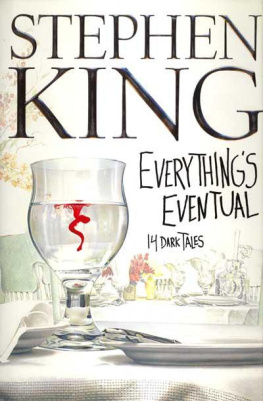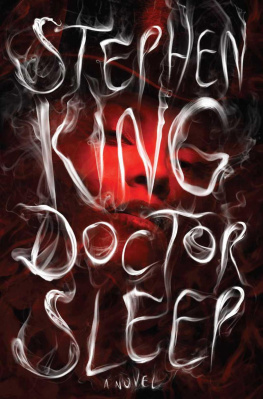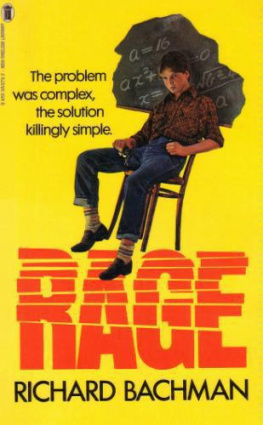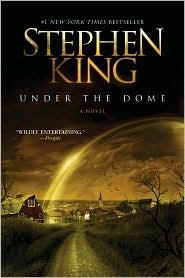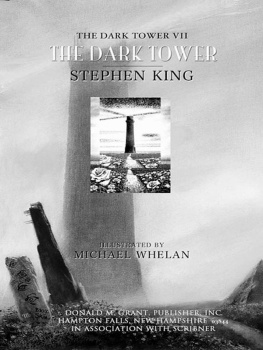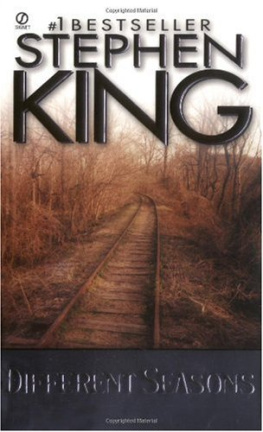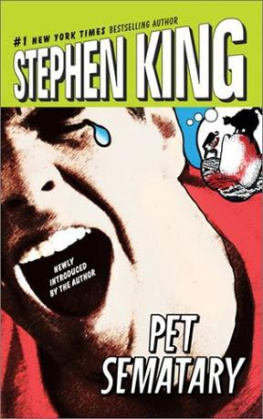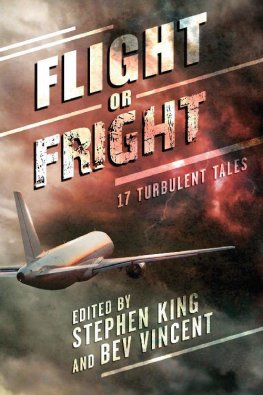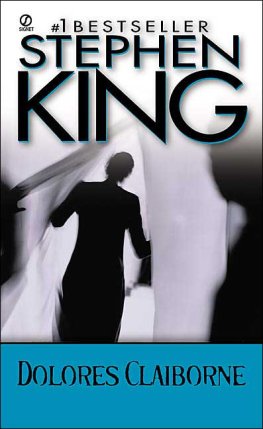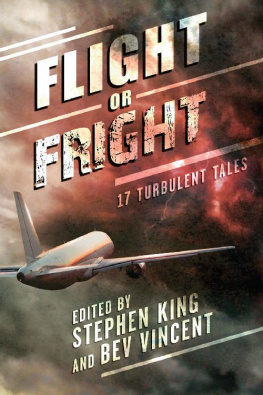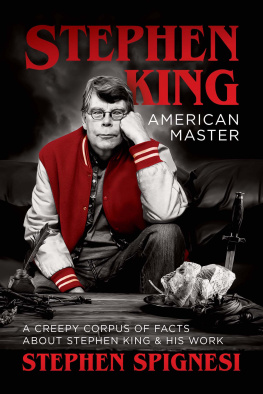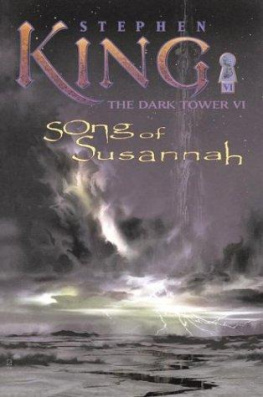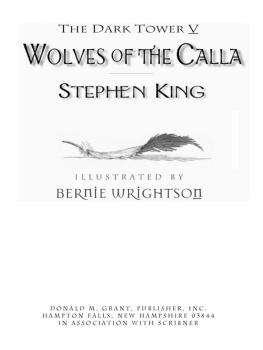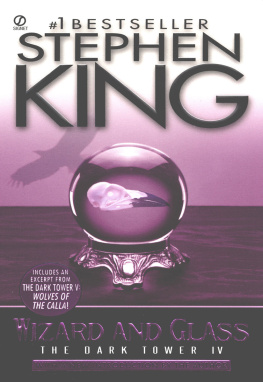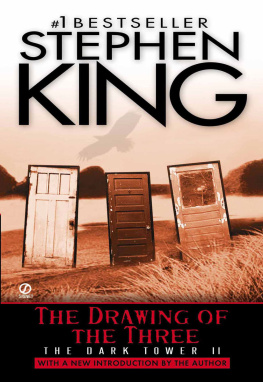Stephen King - Everythings Eventual: 14 Dark Tales
Here you can read online Stephen King - Everythings Eventual: 14 Dark Tales full text of the book (entire story) in english for free. Download pdf and epub, get meaning, cover and reviews about this ebook. year: 2002, publisher: Simon and Schuster, genre: Art. Description of the work, (preface) as well as reviews are available. Best literature library LitArk.com created for fans of good reading and offers a wide selection of genres:
Romance novel
Science fiction
Adventure
Detective
Science
History
Home and family
Prose
Art
Politics
Computer
Non-fiction
Religion
Business
Children
Humor
Choose a favorite category and find really read worthwhile books. Enjoy immersion in the world of imagination, feel the emotions of the characters or learn something new for yourself, make an fascinating discovery.
- Book:Everythings Eventual: 14 Dark Tales
- Author:
- Publisher:Simon and Schuster
- Genre:
- Year:2002
- Rating:3 / 5
- Favourites:Add to favourites
- Your mark:
- 60
- 1
- 2
- 3
- 4
- 5
Everythings Eventual: 14 Dark Tales: summary, description and annotation
We offer to read an annotation, description, summary or preface (depends on what the author of the book "Everythings Eventual: 14 Dark Tales" wrote himself). If you haven't found the necessary information about the book — write in the comments, we will try to find it.
Everythings Eventual: 14 Dark Tales — read online for free the complete book (whole text) full work
Below is the text of the book, divided by pages. System saving the place of the last page read, allows you to conveniently read the book "Everythings Eventual: 14 Dark Tales" online for free, without having to search again every time where you left off. Put a bookmark, and you can go to the page where you finished reading at any time.
Font size:
Interval:
Bookmark:
STEPHEN
KING
Everything's
Eventual
1 4 D A R K T A L E S
SCRIBNER
New York London Toronto Sydney Singapore
SCRIBNER
1230 Avenue of the Americas
New York, NY 10020
Visit us on the World Wide Web: http://www.SimonSays.com
This book is a work of fiction. Names, characters, places, and incidents either are products of the author's imagination or are used fictitiously. Any resemblance to actual events or locales
or persons, living or dead, is entirely coincidental.
Copyright 2002 by Stephen King
All rights reserved, including the right of reproduction in whole or in part in any form.
SCRIBNER and design are trademarks of Macmillan Library Reference USA, Inc.,
used under license by Simon & Schuster, the publisher of this work.
DESIGNED BY ERICH HOBBING
Set in Garamond No. 3
ISBN 0-7432-3704-8
The following selections, some in different form, were previously published: "Autopsy Room Four" in Robert Bloch's P sychos; "The Man in the Black Suit" in The New Yorker and Y ear's Best Fantasy & Horror 1995; "All That You Love Will Be Carried Away" and "The Death of Jack Hamilton" in The New Yorker; "In the Deathroom" on Blood and Smoke (audio book); "The Little Sisters of Eluria" in L egends; "Everything's Eventual" in F antasy & Science Fiction and on F13 (CD-ROM); "L.T.'s Theory of Pets" in The Best of the Best 1998; "The Road Virus Heads North" in 999; "Lunch at the Gotham Caf" in Dark Love, Year's Best Fantasy and Horror 1996 and on Blood and Smoke (audio book); "That Feeling, You Can Only Say What It Is in French" in The New Yorker; "1408" on Blood and Smoke (audio book); "Riding the Bullet" as a Scribner e-book; and "Luckey Quarter" in USA Weekend.
This is for Shane Leonard
Contents
What I did was take all the spades out of a deck of cards plus a joker. Ace to King = 113. Joker = 14. I shuffled the cards and dealt them. The order in which they came out of the deck became the order of the stories, based on their position in the list my publisher sent me. And it actually created a very nice balance between the literary stories and the all-out screamers. I also added an explanatory note before or after each story, depending on which seemed the more fitting position. Next collection: selected by Tarot.
Introduction: Practicing the (Almost) Lost Art 11
Autopsy Room Four 19
The Man in the Black Suit 45
All That You Love Will Be Carried Away 71
The Death of Jack Hamilton 87
In the Deathroom 119
The Little Sisters of Eluria 145
Everything's Eventual 211
L.T.'s Theory of Pets 265
The Road Virus Heads North 287
Lunch at the Gotham Caf 313
That Feeling, You Can Only Say What It Is in French 347
1408 365
Riding the Bullet 405
Luckey Quarter 447
Introduction: Practicing the (Almost) Lost Art
I've written more than once about the joy of writing and see no need to reheat that particular skillet of hash at this late date, but here's a confession: I also take an amateur's slightly crazed pleasure in the business side of what I do. I like to goof widdit, do a little media cross-pollination and envelope-pushing. I've tried doing visual novels ( Storm of the Century, Rose Red ), serial novels ( The Green Mile ), and serial novels on the Internet ( The Plant ). It's not about making more money or even precisely about creating new markets; it's about trying to see the act, art, and craft of writing in different ways, thereby refreshing the process and keeping the resulting artifactsthe stories, in other wordsas bright as possible.
I started to write "keeping [the stories] new" in the line above, then deleted the phrase in the interest of honesty. I mean, come on here, ladies and gentlemen, whom can I possibly kid at this late date, except maybe myself? I sold my first story when I was twenty-one and a junior in college. I'm now fifty-four, and have run a lot of language through the 2.2-pound organic computer/word processor I hang my Red Sox cap on. The act of writing stories hasn't been new for me in a long time, but that doesn't mean it's lost its fascination. If I don't find ways of keeping it fresh and interesting, though, it'll get old and tired in a hurry. I don't want that to happen, because I don't want to cheat the people who read my stuff (that would be you, dear Constant Reader), and I don't want to cheat myself, either. We're in it together, after all. This is a date we're on. We should have fun. We should dance.
So, keeping that in mind, here's yet another story. My wife and I own these two radio stations, okay? WZON-AM, which is sports radio, and WKIT-FM, which is classic rock ("The Rock of Bangor," we say). Radio is a tough business these days, especially in a market like Bangor, where there are too many stations and not enough listeners. We've got contemporary country, classic country, oldies, classic oldies, Rush Limbaugh, Paul Harvey, and Casey Kasem. The Steve and Tabby King stations ran in the red for a lot of yearsnot deep in the red, but far enough to bug me. I like to be a winner, you see, and while we were winning in the Arbs (that would be the Arbitron ratings, which are to radio what the Nielsens are to TV), we kept coming up short on the bottom line at the end of the year. It was explained to me that there just wasn't enough ad revenue in the Bangor market, that the pie had been cut into too many slices.
So I had an idea. I'd write a radio play, I thought, sort of like the ones I used to listen to with my grandfather when I was growing up (and he was growing old) in Durham, Maine. A Halloween play, by God! I knew about Orson Welles's famousor infamousHalloween adaptation of The War of the Worlds on The Mercury Theatre , of course. It was Welles's conceit (his absolutely brilliant conceit) to do H. G. Wells's classic invasion story as a series of news bulletins and reports. It worked, too. It worked so well that it sparked a national panic and Welles (Orson, not H.G.) had to make a public apology on the following week's Mercury Theatre. (I bet he made it with a smile on his faceI know I'd be smiling, if I were ever to come up with a lie so powerful and persuasive.)
I thought what had worked for Orson Welles would work for me. Instead of starting with dance-band music, as the Welles adaptation did, mine would start with Ted Nugent wailing on "Cat Scratch Fever." Then an announcer breaks in, one of our actual WKIT air personalities (nobody calls em deejays anymore). "This is JJ West, WKIT news," he says. "I'm in downtown Bangor, where roughly a thousand people are jammed into Pickering Square, watching as a large, silvery disc-like object descends toward the ground... wait a minute, if I raise the mike, perhaps you can hear it."
And, just like that, we'd be off to the races. I could use our very own in-house production facilities to create the audio effects, local community-theater actors to do the roles, and the best part? The very best part of all? We could record the result and syndicate it to stations all over the country! The resulting income, I figured (and my accountant agreed), would be "radio station income" instead of "creative writing income." It was a way to get around the advertising revenue shortfall, and at the end of the year, the radio stations might actually be in the black!
The idea for the radio play was exciting, and the prospect of helping my stations into a profit position with my skills as a writer for hire was also exciting. So what happened? I couldn't do it, that's what happened. I tried and I tried, and everything I wrote came out sounding like narration. Not a play, the sort of thing that you see unspooling in your mind (those old enough to remember such radio programs as Suspense and Gunsmoke will know what I mean), but something more like a book on tape. I'm sure we still could have gone the syndication route and made some money, but I knew the play would not be a success. It was boring. It would cheat the listener. It was busted, and I didn't know how to fix it. Writing radio plays, it seems to me, is a lost art. We have lost the ability to see with our ears, although we had it once. I remember listening to some radio Foley guy tapping a hollow block of wood with his knuckles... and seeing Matt Dillon walking to the bar of the Long Branch Saloon in his dusty boots, clear as day. No more. Those days are gone.
Font size:
Interval:
Bookmark:
Similar books «Everythings Eventual: 14 Dark Tales»
Look at similar books to Everythings Eventual: 14 Dark Tales. We have selected literature similar in name and meaning in the hope of providing readers with more options to find new, interesting, not yet read works.
Discussion, reviews of the book Everythings Eventual: 14 Dark Tales and just readers' own opinions. Leave your comments, write what you think about the work, its meaning or the main characters. Specify what exactly you liked and what you didn't like, and why you think so.

